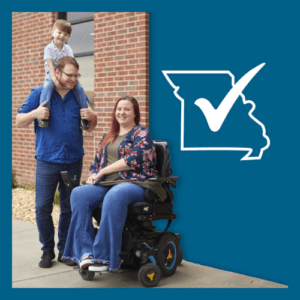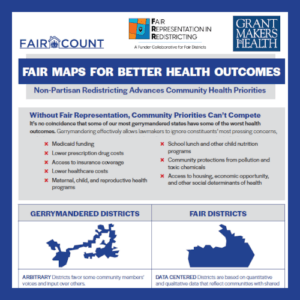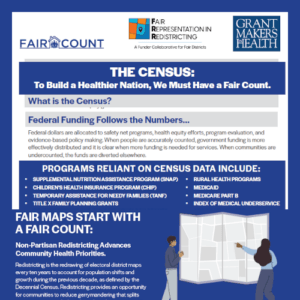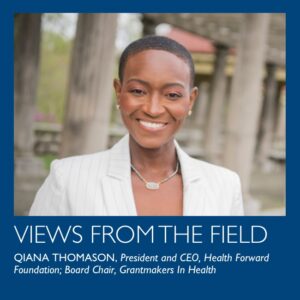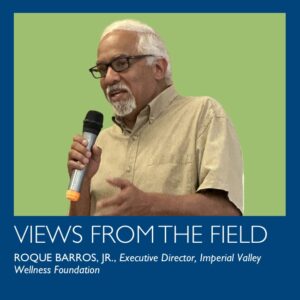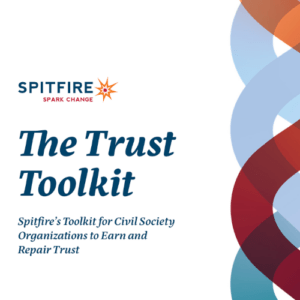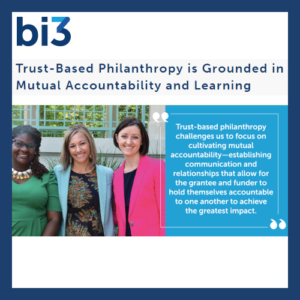Featured Resources
Raising the Bar on Voting Accessibility in Missouri
Missouri Foundation for Health has developed a policy brief with recommendations supporting the efforts of the disability community across the state to make voting processes more accessible for all Missourians.
Fair Maps For Better Health Outcomes
Non-Partisan Redistricting Advances Community Health Priorities. Without Fair Representation, Community Priorities Can’t Compete. It’s no coincidence that some of our most gerrymandered states have some of the worst health outcomes. Philanthropy can’t solve health inequities alone. But supporting community-led work to secure fair districts can help change the system – and strengthen our democracy – by allowing communities to choose responsive lawmakers who will fight for better health policy.
To Build a Healthier Nation, We Must Have a Fair Count
Every decade, the Census Bureau fulfills a constitutionally-mandated count of every person living in the
United States. Data derived from the Decennial Census and the ongoing American Community Survey form the statistical backbone for public health, hospitals, insurance, and dozens of federal and other government programs. This data is also an important tool for funder decision-making. For funders focused on health equity, quality data is needed to provide a better understanding of health disparities and the advancement of health equity goals.
Explore Community Engagement and Empowerment Topics
Latest Resources
Power to the People: Advancing Impact Through Participatory Budgeting
Who is best positioned to determine how health funding should be allocated? At the Community Health Commission of Missouri (CHCM), we believe the answer is clear: the people most affected by health disparities.
How Pew Is Learning to Improve Health Policy
Antibiotics revolutionized medical treatment and are a cornerstone of modern health care. However, the global rise of antibiotic-resistant bacteria is making infections costlier and deadlier. After a 2008 report commissioned by The Pew Charitable Trusts highlighted these concerns, the organization invested in multiple projects to set limits on the use of antibiotics and to spur the development of new drugs.
Jane Perkins of the National Health Law Program to Be Honored with the Andy Hyman Award for Advocacy
Jane Perkins, Litigation Director of the National Health Law Program (NHeLP) in Washington, DC, will receive Grantmakers In Health’s 2025 Andy Hyman Award for Advocacy.
Investing in Civic Infrastructure: The Rise of a New Foundation in a Rural, Disinvested Community
When people hear about our work in Imperial Valley, they often exclaim, “How exciting to build a new foundation!” But I gently redirect them: We’re not building another institution— the last thing our communities need is another organization competing for resources. Instead, we’re building civic infrastructure to create the framework for lasting, community-led change.
Reports and Publications
Public Policy Engagement During an Election Year
Political elections create both challenges and opportunities for foundations seeking to inform and influence the public policy process. Philanthropic organizations have broad latitude to conduct or sponsor a variety of policyrelated activities, and this flexibility includes the ability to promote civic engagement and encourage informed participation in democratic elections.
2011 Terrance Keenan Award Acceptance Speech
Read the acceptance speech of Drew Altman, head of The Henry J. Kaiser Family Foundation, upon receiving the 2011 Terrance Keenan Leadership Award in Health Philanthropy. He shares his thoughts on what foundations should be, concerns about the field, the theory of change, and his experience transforming Kaiser into what it is today.
Building Capacity for Health Advocacy at the State and Local Level
This paper was prepared in conjunction with a strategy session convened by GIH and sponsored by the Missouri Foundation for Health and The California Endowment last fall. It examines philanthropy’s role in advocacy, the various sectors that constitute the field of health advocacy, capacities required to effectively engage in advocacy efforts, ways health funders have facilitated advocacy capacity development, and key issues for future action.

